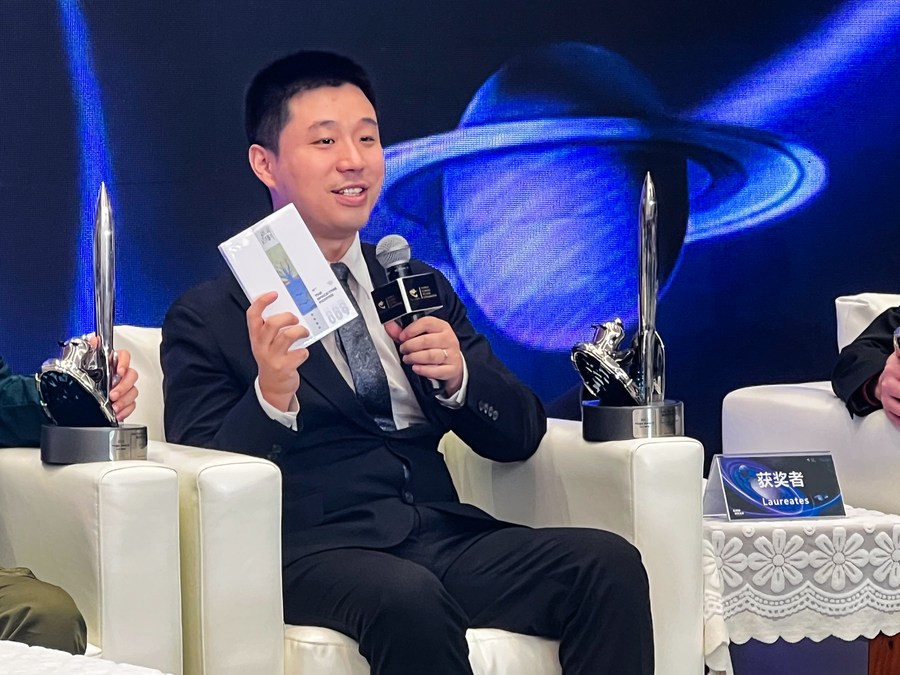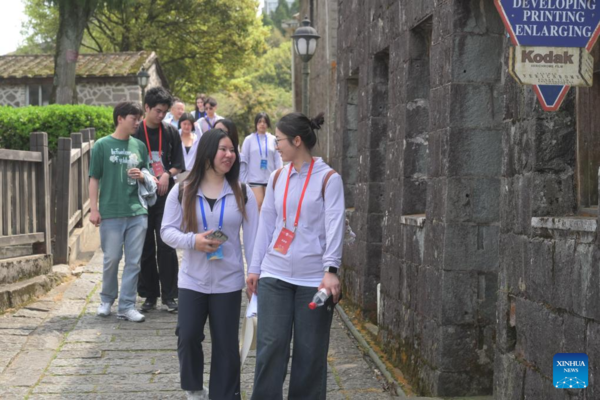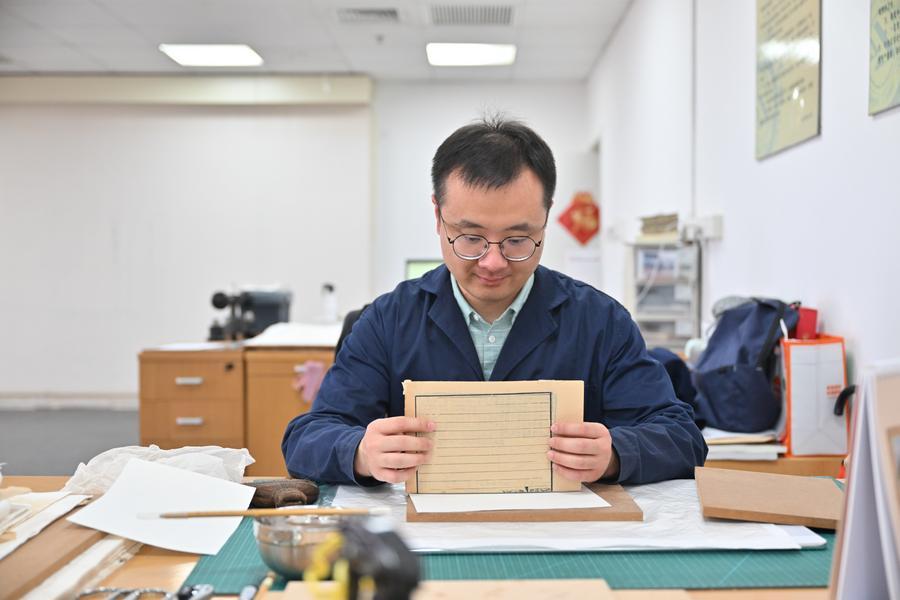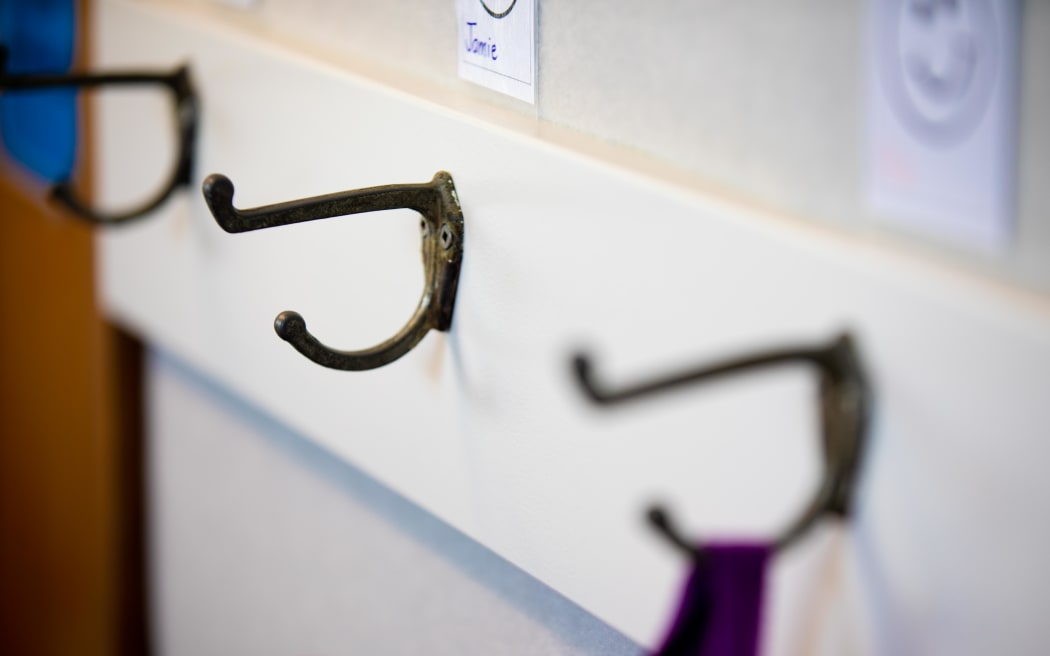Novelette inspired by ancient painting wins Hugo Award

Chinese author Hai Ya speaks during an interview after winning the Best Novelette award for "The Space-Time Painter" at the 2023 Hugo Awards during the 81st World Science Fiction Convention (WorldCon) in Chengdu, Southwest China's Sichuan province, Oct 21, 2023. [Photo/Xinhua]
Chinese writer Hai Ya's The Space-Time Painter won the Hugo Award for Best Novelette on Saturday. He became the third Chinese writer to win a Hugo award after Liu Cixin in 2015 and Hao Jingfang in 2016.
The Hugo Awards, the world's top literary accolades for science fiction writing, were announced at the 2023 Chengdu World Science Fiction Convention in Southwest China's Sichuan province. The event was held from Wednesday through Sunday.
Hai Ya's novelette is inspired by a painting masterpiece, Qianli Jiangshan Tu, or A Panorama of Rivers and Mountains, by Wang Ximeng from the Song Dynasty (960-1279). Hai Ya has woven the story of Wang's life into a thriller that combines the elements of traditional Chinese culture and history with sci-fi and detective genres.
Modeled on the life of Wang, Hai Ya has created the character of painting prodigy Zhao Ximeng, who painted for an emperor more than 1,000 years ago. After much misery and suffering, the painter's mind abandons his physical body and enters a space where a modern police officer is investigating a case involving an ancient painting. The story reveals the political upheavals of the period during which the painting was created.
Working in the financial industry, Hai Ya, 33, started writing sci-fi stories in 2016 and published his first work in 2019.
The Hugo Award for Best Professional Artist went to Chinese digital artist Zhao Enzhe. Hailed as the "Liu Cixin of illustration" and best domestic artist in terms of sci-fi content creation, he won the Galaxy Award, China's top sci-fi prize, for best related book in 2021.
Zhao had once mentioned in an interview that almost all his works were created when he kept exploring the idea of merging sci-fi with Chinese traditional culture.
"I have always admired ancient Chinese paintings, which are so graceful and full of vitality," he said, adding that "ancient Chinese culture provides the best style for sci-fi illustrations, and I hope I can create more sci-fi artworks that incorporate Chinese philosophical thinking for foreign audiences".
Chinese fan magazine Zero Gravity Newspaper won the best fanzine award. Co-founded by "RiverFlow" and Ling Shizhen, the fanzine aims to unite sci-fi fans in China to do interviews and investigations about past sci-fi events, comment on latest news and trending topics, and introduce news, history and current situations related to science fiction.
Commenting on the Chinese winners of the Hugo Awards, sci-fi writer Han Song wrote on Sina Weibo that it shows that a new force of Chinese sci-fi has risen, and sci-fi has become a name card and a language for China to communicate with the world. But he said he also felt the need for Chinese sci-fi writers to work even harder because of the strong position Europe and the United States enjoy in this area.
US writers T. Kingfisher, Seanan McGuire and Samantha Mills won the best novel, best novella and best short story awards, respectively, for Nettle &Bone, Where the Drowned Girls Goand Rabbit Test.
A total of 19 awards in different categories were announced on Saturday at the convention in Chengdu. It was the first time that the world's top sci-fi convention was held in China.
Related articles

Chinese scientists use machine learning for precise Antarctic sea ice prediction
Chinese scientists made accurate predictions regarding Antarctic sea ice for December 2023 to Februa2024-04-30Truancy: Why it matters, what the law says and what is being done about it
Photo: RNZ / Marika Khabazi2024-04-30Two in custody after armed police swarm Auckland suburb
Police are considering charges over an incident in Auckland's central suburbs on Thursday. Photo: 122024-04-30Two bodies recovered as divers search river after ship hit Baltimore bridge
This handout screegrab courtesy of the National Transportation Safety Board shows part of the steel2024-04-30
Chemical and biological methods help restore ancient books in north China
Gao Xuemiao binds a restored ancient book at Tianjin Library in north China's Tianjin Municipali2024-04-30Whale euthanised after stranding near Christchurch
Whale stranded at Banks Peninsula on 20 March 2024. Photo: Facebook / Project Jonah2024-04-30





atest comment